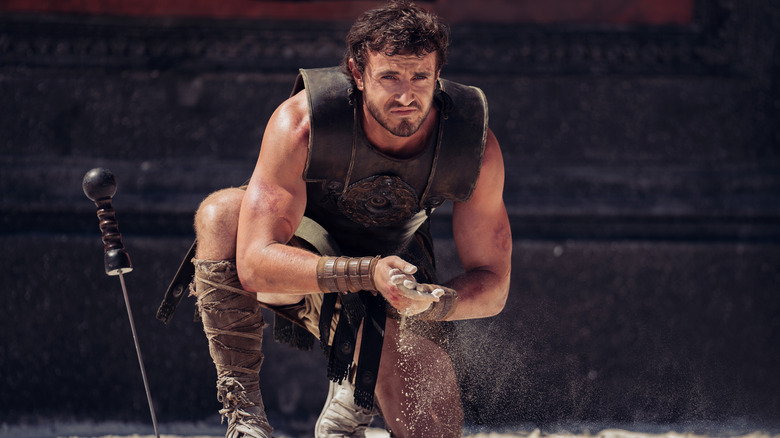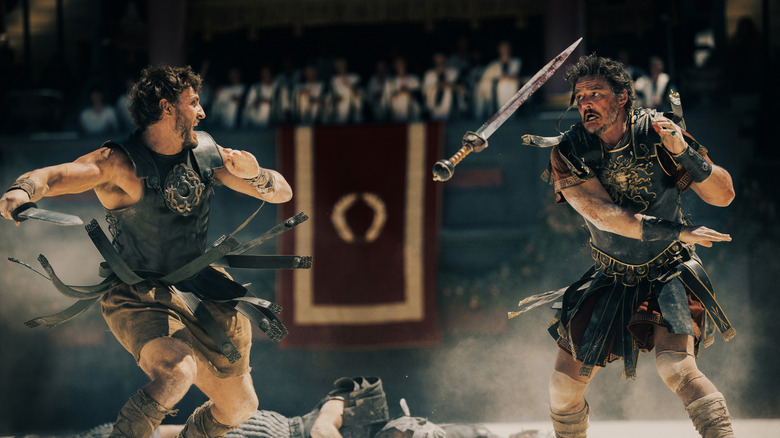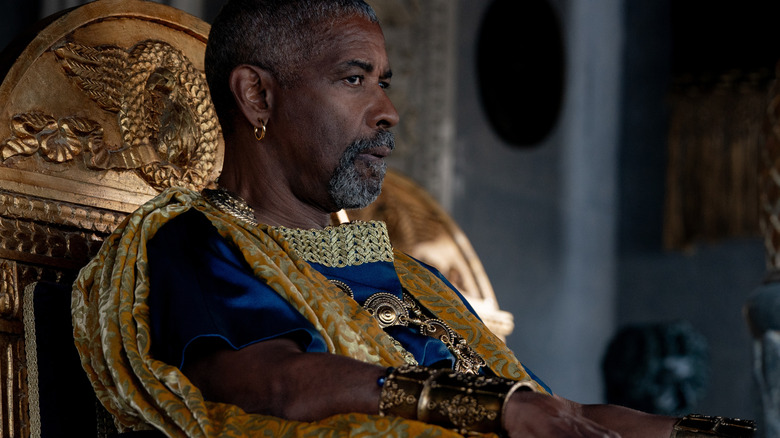Gladiator II Review: A Heart-Pounding Sword-And-Sandal Adventure
- Excellent action set pieces
- Denzel Washington is having a whale of a time
- Many of the supporting characters are underdeveloped
- Paul Mescal doesn’t get a fiery monologue to equal Russell Crowe’s “father to a murdered son, husband to a murdered wife” moment
It's been 24 years since Russell Crowe made a permanent mark on the Roman historical epic, and "Gladiator II" has some big shoes to fill. With the effervescently energetic Ridley Scott returning to direct the follow up to the modern swords-and-sandals classic, "Gladiator II" features endlessly imaginative set pieces that will amaze audiences just as much as its predecessor did. If it doesn't quite match the staggering highs of Crowe's biggest movie star moments in the original, it comes pretty close — and that's saying something. With Paul Mescal taking on leading man duties, "Gladiator II" capitalizes on all the visual delights and heroic battles that make this genre — when done well — so enjoyable to watch.
"Gladiator II" begins about 20 years after the first film left off, with Rome in an active state of decay even as its vast armies continue their conquest of the world. The empire is ruled by a pair of brothers, Geta and Caracalla (Joseph Quinn and Fred Hechinger), sickly full-grown toddlers who have reached adulthood without a thought in their heads beyond pleasure and maintaining their own position. In North Africa, Numidia stands as one of the last free cities outside Roman control — a problem the war-weary General Marcus Acacius (Pedro Pascal) hopes to correct as he launches his intimidating army at it. Lucius (Mescal) and his wife mount a spirited defense of Numidia, but one that is ultimately doomed to failure, resulting in her death and his capture. A brutal fighter with nothing to lose, Lucius catches the eye of Macrinus (Denzel Washington), who supplies gladiators for the entertainment of Rome, and he ends up fighting in the Colosseum. But although he's initially driven by revenge for his wife's death, Lucius' birthright and the promise of what Rome could be under the right leaders begin to impact his decisions in and out of the arena.
Is Gladiator II a retread of the original?
In a sequel like this, the biggest question has to be, what does this offer that's different from the original? Does it make an argument to justify its own existence? While "Gladiator II" follows a lot of the same beats as the first film, there's enough here to prevent it from feeling like a soulless clone. Lucius occupies the same heroic gladiator role as Russell Crowe's Maximus, but he also gives us the interesting perspective as an outsider. Maximus, for better or worse, was a part of the Roman system, happily serving its colonial interests until he was personally wronged. By contrast, Lucius — despite his Roman heritage — sees Rome as a source of oppression even before he's put in chains and forced to fight baboons (yes, really). This vision of the prodigal son, the prince who was promised, plays into the ultimate fantasy that even in a rapidly deteriorating society, there's someone competent and honorable waiting in the wings to save us from our petty, impulsive, syphilitic overlords.
Paul Mescal may not get the towering monologues that made Crowe's Maximus so memorable, but he puts in a commanding physical performance and provides a steady, likable presence that grounds Ridley Scott's stunning set pieces. Lucius quickly takes on the role of leader amongst the gladiators, and although he gets plenty of one-on-one action, Scott also stages multiple sequences within the Colosseum as military recreations, giving us insight into Lucius' character not through dialogue but through his approach to strategy. This, of course, also allows Scott to do what he does best as a director, creating complicated, dynamic action scenes that — even when they fall prey to some dodgy CGI — pull the audience in. Where else would you see the Colosseum flooded and playing host to a fully realized naval battle, complete with hungry sharks circling below? (A set piece that is, surprisingly, not historically inaccurate.)
Denzel came to play
While Paul Mescal ably leads the production, Denzel Washington is the one who steals the show as Macrinus, an opportunistic businessman who plays the entire city of Rome like a fiddle. His political machinations would have Machiavelli taking notes, but he keeps them veiled with a warm, gregarious veneer that leaves others blind to the threat he poses. Washington imbues the character with charm and a wily intelligence, making a meal of Macrinus but never going full ham. The rest of the ensemble cast, although chronically underwritten, find their moments to shine. Fred Hechinger as the childlike, half-mad emperor who gleefully appoints his pet monkey as first counsel; Pedro Pascal as the general with a backbone of steel who's tired of war but launches one final campaign for the good of Rome; Alexander Karim as Ravi, a gladiator-turned-healer who befriends Lucius while tending to his wounds.
Some will find that "Gladiator II" doesn't do enough to distinguish itself from its illustrious predecessor. That's fair. But although the film does incorporate the lazier form of legacy storytelling — by telling us that we should care about a character simply because they are the child of a beloved character from the original — it also manages to carry on the spirit of "Gladiator," a far trickier endeavor. So even if it doesn't change the world with its new take on the gladiator narrative, it's just as exciting and entertaining to watch as "Gladiator" — if slightly less profound.
"Gladiator II" hits theaters on November 22.


